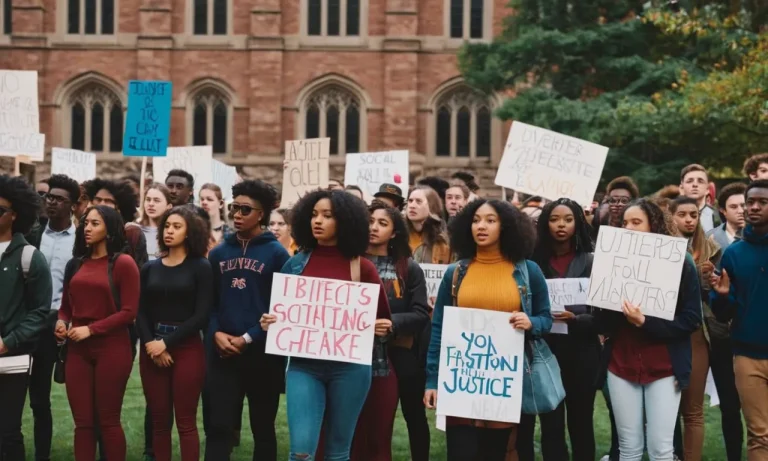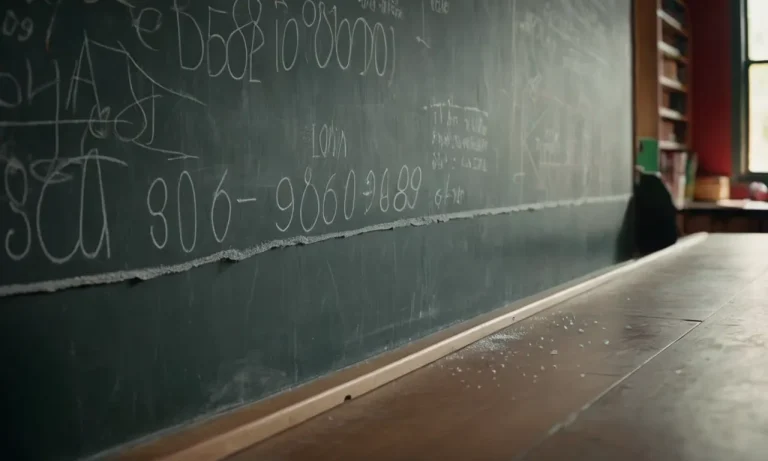Navigating the complexities of background checks can be a daunting task, especially when it comes to verifying educational credentials. Whether you’re applying for a job, seeking a professional license, or exploring other opportunities, understanding what information a background check can reveal about your high school education is crucial.
If you’re short on time, here’s a quick answer to your question: In most cases, a standard background check does not directly reveal whether you graduated from high school or not. However, certain types of background checks, such as those conducted for specific industries or positions, may delve deeper into your educational history and potentially uncover information about your high school graduation status.
In this comprehensive article, we’ll explore the intricacies of background checks and their relationship with high school education verification. We’ll cover the different types of background checks, the information they typically include, and the circumstances under which your high school graduation status may be scrutinized.
Additionally, we’ll provide insights into best practices for handling educational credentials during the background check process.
Understanding Background Checks
In today’s world, background checks have become an integral part of various processes, from employment screening to tenant verification. But what exactly is a background check, and what types of information does it reveal? Let’s dive in and explore this crucial topic.
What is a Background Check?
A background check is a process of gathering and reviewing information about an individual’s history, including their criminal records, employment history, education credentials, and other relevant details.
It’s a comprehensive investigation that aims to provide a clearer picture of a person’s background and potential red flags.
Common Types of Background Checks
- Criminal Background Check: This type of check reveals any criminal convictions, arrests, or pending charges an individual may have. According to a SHRM survey, 94% of employers conduct criminal background checks on job candidates.
- Employment Verification: This process verifies an individual’s work history, job titles, and dates of employment with their previous employers.
- Education Verification: This check confirms an individual’s educational qualifications, such as high school diplomas, college degrees, or professional certifications.
- Credit Check: Employers or landlords may request a credit check to assess an individual’s financial responsibility and potential risk.
Purposes of Background Checks
Background checks serve various purposes across different industries and situations. Here are some common reasons why they are conducted:
- Employment Screening: Employers conduct background checks to ensure the safety and security of their workplace, protect their assets, and make informed hiring decisions. This process helps them identify potential risks or concerns related to a candidate’s background.
- Tenant Screening: Landlords and property management companies often perform background checks on potential tenants to assess their reliability, criminal history, and financial stability before renting out a property.
- Volunteer Screening: Organizations that involve volunteers, especially those working with vulnerable populations like children or the elderly, may conduct background checks to ensure the safety and well-being of their clients.
- Professional Licensing: Certain professions, such as healthcare, education, or finance, require background checks as part of the licensing or certification process to ensure individuals meet the necessary standards and qualifications.
It’s important to note that background check regulations and requirements can vary depending on the state or country, as well as the industry or organization conducting the check. Reputable background check companies, such as GoodHire, provide comprehensive and compliant background screening services to help organizations make informed decisions while adhering to relevant laws and regulations.
High School Education and Background Checks
Standard Background Checks and High School Graduation
When it comes to standard background checks, the focus is typically on an individual’s criminal history, employment verification, and credit history. In most cases, a background check will not reveal whether you graduated from high school or not.
😮 This is because high school education is generally not a requirement for most jobs, and employers tend to prioritize other aspects of a candidate’s background during the hiring process.
However, it’s important to note that while a standard background check may not directly confirm your high school graduation status, it could potentially uncover discrepancies or inconsistencies if you provide false information on your job application or resume.
👀 Lying about your educational qualifications can be considered a form of fraud, and if discovered, it could jeopardize your chances of getting hired or even lead to termination if you’re already employed.
Exceptions: When High School Education Matters
There are certain industries and professions where high school education can play a more significant role in the hiring process. In these cases, employers may request additional verification or documentation to confirm an applicant’s educational background. Some examples include:
- Government or military positions: Many government agencies and military branches have specific educational requirements, including a high school diploma or equivalent.
- Skilled trades and apprenticeships: Certain skilled trades, such as plumbing, electrical work, or construction, may require proof of high school education as a prerequisite for apprenticeship programs or licensing.
- Law enforcement and public safety: Police officers, firefighters, and other public safety professionals often need to meet minimum educational standards, including a high school diploma or GED.
In these cases, employers may request official transcripts or other documentation from the high school or educational institution to verify your graduation status. Failing to provide accurate information could result in disqualification or termination from the hiring process or job.
Industries with Stricter Educational Requirements
While a high school diploma may not be a strict requirement for many jobs, certain industries or positions may have higher educational standards. For example, according to the U.S. Bureau of Labor Statistics 69.7% of 2016 high school graduates enrolled in college the following October.
This highlights the importance of higher education in today’s job market.
In fields like healthcare, finance, engineering, and technology, employers often seek candidates with college degrees or advanced certifications. While a high school diploma may be the minimum requirement, these industries tend to have stricter educational requirements and may conduct more thorough background checks to verify an applicant’s academic credentials.
| Industry | Typical Educational Requirements |
|---|---|
| Healthcare | Bachelor’s degree or higher for many roles, specialized certifications or licenses for certain positions |
| Finance | Bachelor’s degree in finance, accounting, or related fields; additional certifications may be required |
| Engineering | Bachelor’s degree or higher in engineering or related technical fields |
| Technology | Bachelor’s degree or higher in computer science, information technology, or related fields; certifications may be required for specific roles |
In these industries, employers may request official transcripts, diplomas, or other documentation to verify an applicant’s educational background during the hiring process. Providing false or misleading information could be grounds for disqualification or termination.
Verifying High School Education
When it comes to background checks for employment or other purposes, one of the key areas that employers and organizations often scrutinize is an individual’s educational history. Specifically, they want to verify whether the applicant truly obtained the high school diploma or equivalent credential they claimed on their resume or application.
This verification process helps ensure the accuracy of the information provided and can impact hiring decisions or eligibility for certain opportunities.
Transcripts and Diploma Verification
One common method for verifying high school education is through the review of official transcripts and diplomas. Many employers or background check companies will request that applicants provide copies of these documents directly from the issuing institution.
This helps establish the legitimacy of the credentials and confirm that the applicant did indeed graduate from the stated high school.
According to a study by the National Association of Professional Background Screeners, nearly 60% of employers conduct education verification as part of their background check process. Reputable high schools and school districts typically have procedures in place to handle such verification requests, often through their registrar’s office or a dedicated verification service.
Third-Party Education Verification Services
In addition to direct verification with educational institutions, many employers and background check companies rely on third-party education verification services. These specialized firms, such as DegreeChk or HireRight, have established relationships with schools and databases to streamline the verification process.
They can quickly confirm whether an applicant’s claimed high school education is accurate and provide detailed reports to their clients.
The use of third-party verification services can be particularly useful for employers with a high volume of applicants or those dealing with educational institutions that may be difficult to reach or unresponsive.
These services often have access to extensive databases and can cross-reference information from multiple sources to ensure accuracy.
Self-Reporting and Honesty Policies
While verification through official channels is the most reliable method, some organizations may rely on self-reporting and honesty policies when it comes to high school education. In these cases, applicants are required to attest to the truthfulness of their educational claims, often with the understanding that any misrepresentation or falsification could result in immediate termination or other consequences.
However, it’s important to note that self-reporting alone may not be sufficient for positions or industries with stricter compliance requirements or higher levels of risk. In such cases, employers may still opt for independent verification through transcripts, diplomas, or third-party services to ensure they have accurate and up-to-date information about an applicant’s educational background.
Ultimately, verifying high school education is an essential part of the background check process for many employers. By utilizing various verification methods, organizations can make informed hiring decisions, mitigate risks, and maintain a high level of integrity within their workforce. 😊
Best Practices for Handling Educational Credentials
Maintaining Accurate Records
Ensuring accurate educational credentials is crucial for both individuals and employers. According to a survey by the Society for Human Resource Management (SHRM), over 90% of employers conduct background checks on potential hires.
This underscores the importance of maintaining up-to-date and verifiable records of your educational achievements. Failure to do so can lead to misunderstandings, delays in the hiring process, or even disqualification from consideration. It’s recommended to keep copies of transcripts, diplomas, and any relevant certifications readily available for reference.
Disclosing Educational Information
Transparency and honesty are key when it comes to disclosing your educational background. Misrepresenting or omitting information can be seen as deceptive and may jeopardize your credibility. During the job application process, it’s essential to accurately report your educational qualifications, including the names of institutions attended, degrees or diplomas earned, and dates of attendance.
According to the U.S. Equal Employment Opportunity Commission (EEOC), failing to disclose relevant educational information can be grounds for termination, even after being hired. 😬
Addressing Discrepancies or Gaps
Life circumstances can sometimes lead to gaps or discrepancies in one’s educational journey. Perhaps you had to take a break from studies due to financial constraints or personal reasons. It’s important to be upfront about such situations and provide context if asked during the hiring process.
Many employers are understanding and may view these experiences as valuable life lessons that shaped your character and resilience. 💪 According to a report by the National Association of Colleges and Employers (NACE), 92% of employers are willing to consider applicants with gaps in their educational history, provided they are honest and can explain the circumstances.
Conclusion
In conclusion, while a standard background check may not directly reveal whether you graduated from high school or not, it’s essential to understand the nuances of different types of background checks and the industries or positions that may require more in-depth educational verification.
By maintaining accurate records, being transparent about your educational credentials, and addressing any discrepancies or gaps proactively, you can navigate the background check process with confidence and integrity.
Ultimately, the decision to disclose or verify high school graduation status lies with the employer, licensing body, or organization conducting the background check. By staying informed and following best practices, you can ensure a smooth and successful background check experience, regardless of your educational background.






